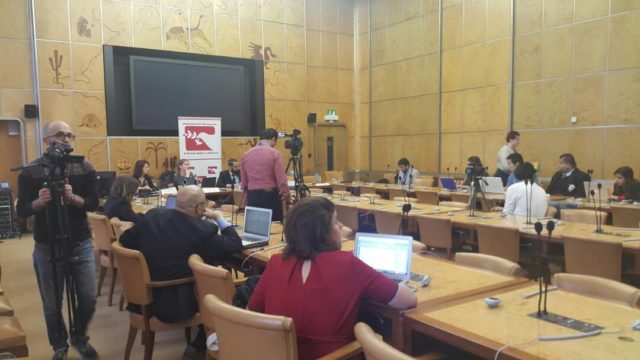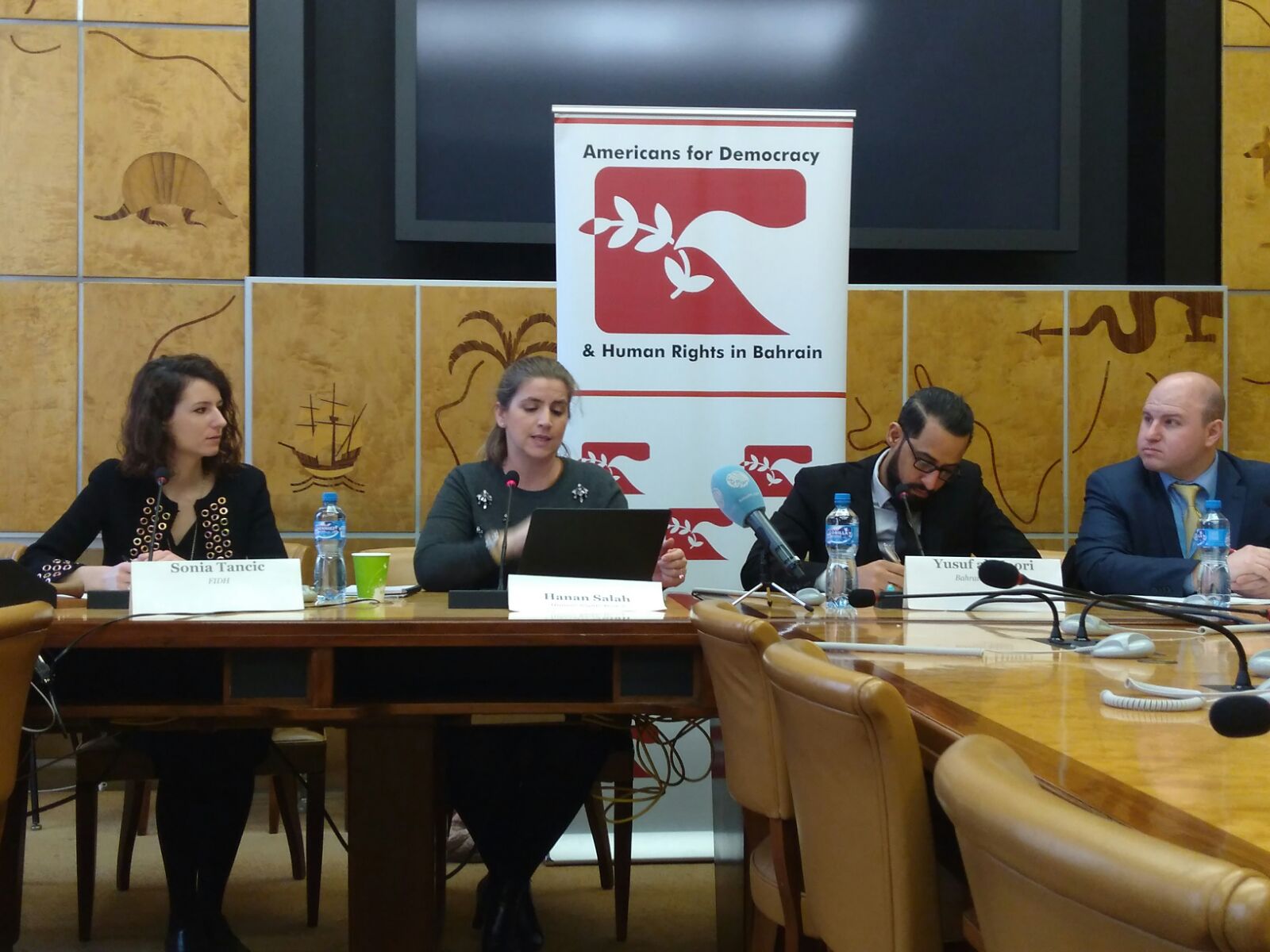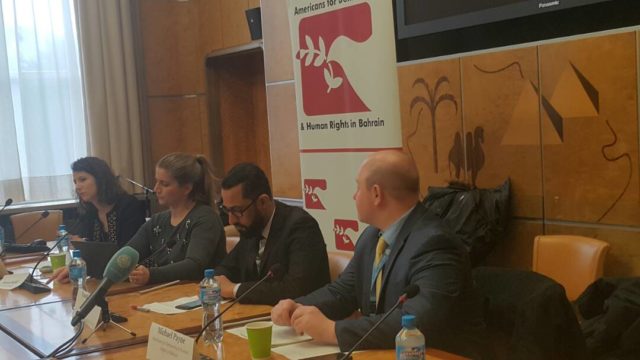
On 6 March 2018, ADHRB hosted a side event during the 37th session of the Human Rights Council focused on the deteriorating human rights situation in Bahrain and the proposed framework under which the Human Rights Council can address human rights violations in Bahrain through a set of objective criteria. The event was cosponsored by Human Rights Watch, the European Center for Democracy and Human Rights (ECDHR), Pen International, Reporters Without Borders, CIVICUS, IFEX, Committee to Protect Journalists (CPJ), FIDH, and the Bahrain Institute for Rights and Democracy (BIRD). It was attended by individuals from State delegations as well as other non-governmental and civil society organizations.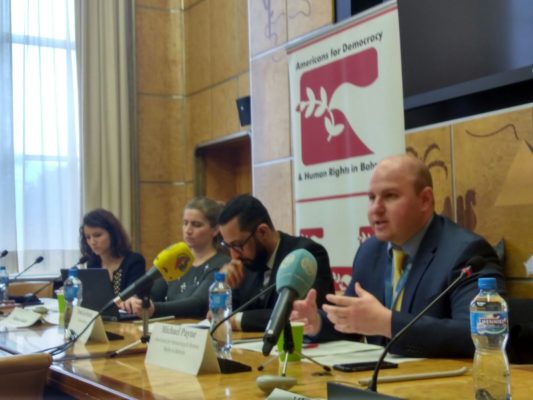
The event was moderated by Sonia Tancic from FIDH, and speakers included Hanan Salah, a researcher for Human Rights Watch; Yusuf al-Hoori, a Bahraini activist; and Michael Payne, the Director of Advocacy for ADHRB.
Ms. Tancic opened the panel event by welcoming participants and guests and highlighting the Council’s lack of attention to gross and systematic human rights violations in Bahrain. Ms. Tancic noted that a number of States have recently dedicated themselves to a set of objective criteria for action in the Human Rights Council that would serve to compel states to act in the event of consistent gross and systematic abuses, and that this provides a new and important opportunity for the Council to engage with Bahrain.

Ms. Salah noted Human Rights Watch’s concern at the deteriorating situation of human rights in Bahrain. In particular the muzzling of free speech by authorities and renewed denaturalization proceedings officials use as a method of punishment for activists and human rights defenders. Ms. Salah highlighted the abrupt end of Bahrain’s de facto moratorium on the death penalty with the execution of men in January 2017, despite allegations of torture, ill-treatment, and unfair trial proceedings. Ms. Salah also noted the government’s move to allow the military trial of civilians, and the restoration of the National Security Agency’s powers of arrest, which had been revoked following the recommendation by the Bahraini Independent Commission of Inquiry in 2011. Ms. Salah also raised concerns over the ineffectual nature of Bahrain’s human rights oversight bodies, such as the Ministry of Interior’s Ombudsman, which, she said, have failed to reverse, or even effectively address, the culture of impunity Bahraini authorities enjoy for actions like torture or unfair trials.
Ms. Salah also discussed concerns surrounding the repression of free expression, stating that there is a “climate of fear” regarding the freedom of expression, noting the dissolution of Al-Wasat, Bahrain’s only semi-independent news outlet and Waad, a political party. The dissolution of Waad speaks also to the suppression of civic space. In this context, she noted that Bahrail will soon be holding its elections, but they will take place in an oppressive environment with no political opposition. She highlighted that there are currently at least 13 activists in prison, including Nabeel Rajab, for crimes relating to free speech, as well as the de facto travel ban for Bahraini human rights defenders: journalists, activists, and human rights defenders are unable to travel freely, including to the Human Rights Council. Returning to the issue of denaturalization, she noted that 578 people have been stripped of their citizenship since 2012, with the government revoking the citizenships of 72 people in the first two months of 2018 alone. She concluded by highlighting that the Government of Bahrain has continually refused to work cooperatively with international human rights mechanisms, and has refused to allow visits by the Special Procedures mandates for years.

Mr. al-Hoori used his remarks to highlight the plight of human rights defenders in Bahrain, in particular the pressures, intimidation, and harassment of defenders who cooperate with international human rights mechanisms like the Human Rights Council. He began by speaking broadly about how human rights defenders in Bahrain have been targeted for arrest, torture, and harassment for their activism, before going in depth into specific cases. He noted the targeting of Sayed Ahmed Alwadaei’s family back in Bahrain for his activism in London. Mr. al-Hoori also related his own story of intimidation, telling the panels’ attendants how Bahraini authorities arrested his father and called him in Berlin from his father’s phone. They threatened to harm and arrest his family members if he did not apologize to the king for his activism in Berlin on behalf of human rights in Bahrain.
When Mr. al-Hoori refused a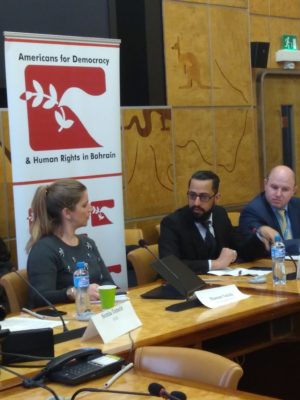 nd ended the call, the authorities repeated this, calling from his sister’s phone and threatening to harm her. Mr. al-Hoori stated that he could hear his sister crying in the background of the phone call. However, he also recalled the wishes of victims of Bahraini authorities that he bring their cases before the international community and to other NGOs, because the Bahraini government and its sham oversight mechanisms will not provide, and cannot provide, any meaningful form of redress.
nd ended the call, the authorities repeated this, calling from his sister’s phone and threatening to harm her. Mr. al-Hoori stated that he could hear his sister crying in the background of the phone call. However, he also recalled the wishes of victims of Bahraini authorities that he bring their cases before the international community and to other NGOs, because the Bahraini government and its sham oversight mechanisms will not provide, and cannot provide, any meaningful form of redress.
He concluded his remarks by calling for a resolution or other form of public pressure on the Bahraini government from the Human Rights Council, noting that since 2011, the situation has deteriorated significantly: more than 50,000 people have been detained by the Bahraini government, and there are currently more than 4,000 individuals in Bahraini detention. He noted that the Universal Periodic Review mechanism in the past has used strong language from States and NGOs, and hopes that the international community will follow this up with strong action.
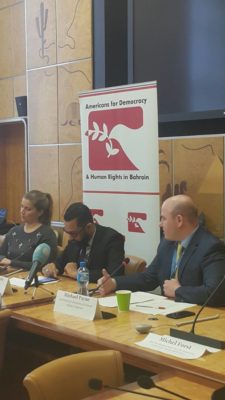 Mr. Payne opened his remarks by stating that the human rights situation in Bahrain is worse now than it has been in previous years, despite public perception that 2011 was a landmark year for violence and abuse. He particularly highlighted the decline since June 2016. He stated that state violence 2011 was in many ways a “knee jerk reaction” to the popular protests, but that since then, Bahrain has institutionalized its methods of repression, cracking down on civil society, using military courts to try civilians, and proposing legislation criminalizing comments made on Twitter and other forms of social media under the counter-terrorism law.
Mr. Payne opened his remarks by stating that the human rights situation in Bahrain is worse now than it has been in previous years, despite public perception that 2011 was a landmark year for violence and abuse. He particularly highlighted the decline since June 2016. He stated that state violence 2011 was in many ways a “knee jerk reaction” to the popular protests, but that since then, Bahrain has institutionalized its methods of repression, cracking down on civil society, using military courts to try civilians, and proposing legislation criminalizing comments made on Twitter and other forms of social media under the counter-terrorism law.
Mr. Payne decried the apathy of the international community in recent years, noting that the international community and particularly the Human Rights Council were very responsive in the immediate aftermath of the 2011 crackdown, but that since 2015, the Council and other international actors have lessened their interest in human rights violations in Bahrain and commitment to addressing it. Mr. Payne noted that the High Commissioner for Human Rights has made several attempts to address human rights violations in Bahrain through multiple mechanisms, but the Government of Bahrain has time and again refused to engage constructively with OHCHR. The Special Procedures offices have likewise been active on Bahrain, condemning the kingdom’s violations numerous times: since 2011, every Joint Communications Report has included cases raised with Bahrain. Despite this, Bahrain continues to refuse to allow visits by the Special Procedures offices. At this point there has been no visit by a mandate holder to Bahrain since 2006, despite repeated requests. Mr. Payne echoed Ms. Salah’s comments, stating that the human rights institutions in Bahrain are “hollow bodies” that do not effectively follow or enforce their mandates and suffer from lack of independence. Like Ms. Salah and Mr. al-Hoori, Mr. Payne also highlighted the issues of reprisals and de facto travel bans on Bahraini civil society at the Human Rights Council.
He concluded his remarks by noting the importance of the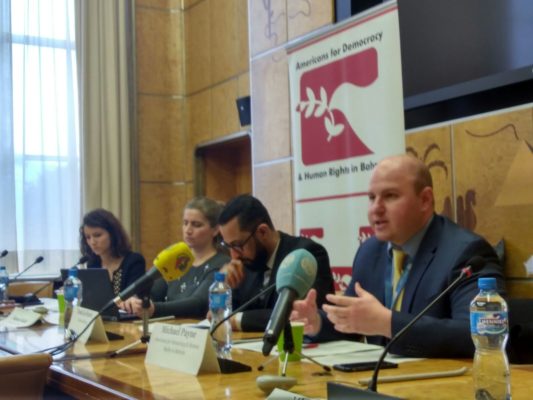 objective criteria raised by Ireland and mentioned by Ms. Salah, to addressing the ongoing, gross and systematic abuses in Bahrain. Bahrain meets all of these criteria and so should be on the Council’s agenda. The use of this criteria to analyze human rights situation should be a good way to de-politicize the work of the Council and the struggle to raise issues of importance in regards to specific states. However, he noted, since we are not yet at that level, what is necessary is increased and sustained public and international pressure and political will to see that the pressure is felt.
objective criteria raised by Ireland and mentioned by Ms. Salah, to addressing the ongoing, gross and systematic abuses in Bahrain. Bahrain meets all of these criteria and so should be on the Council’s agenda. The use of this criteria to analyze human rights situation should be a good way to de-politicize the work of the Council and the struggle to raise issues of importance in regards to specific states. However, he noted, since we are not yet at that level, what is necessary is increased and sustained public and international pressure and political will to see that the pressure is felt.
Ms. Tancic asked a series of questions related to how the Council can address the situation of Bahrain, asking What more can the Council do? Is it enough for the Council to continue to name Bahrain? What is the reason for the lack of the Council’s response to the situation in Bahrain?
Mr. Payne’s answer was that the Council’s efforts are thus far not enough. There has been a concerted effort by the Bahraini government to remove peaceful leaders from the protest movement, which when combined with increasing economic problems and pocketbook issues, has the high potential to lead to increasing frustration among the youth and the possibility of violence. This is what no-one wants to see and this is what civil society is pushing against, although the government has systematically repressed it. 2018 and the opportunity of elections can help lead to improvements, as Bahrain wants to have a good image surrounding the elections. The international community can use this as an opening, but in order to it to do so, there needs to be substantial political will, which has not yet been present. Ultimately, more urgency is needed if things are to change significantly and for the better.
